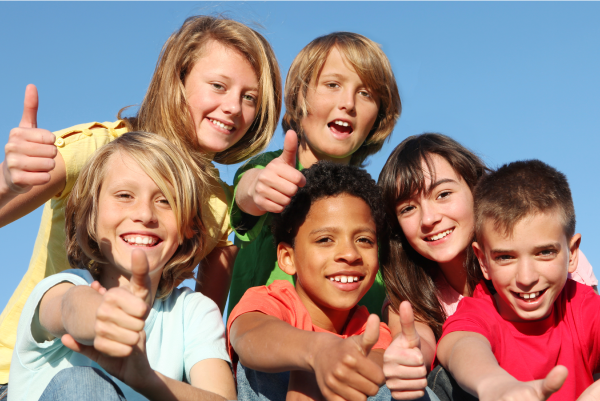
How Physical Activity Combats Mental Health Issues with Children
Posted: July 04, 2018
Everywhere you go these days, you will hear a lot these days about how physical activity is good for your children. It keeps them fit and healthy and can help in preventing diseases like diabetes, heart disease, and high blood pressure. But what is less often discussed, though no less important, is the connection between physical activity and mental health in children.
And this isn’t just wishful guessing either. There’s a lot of empirical evidence to back this up. Many recent medical studies have found strong positive links between physical activity and a variety of mental functions, such as more positive self-esteem and self-perception, sharper cognitive functions, and even positive effects on behavioral disorders like ADHD. It has also been linked to alleviating mental health issues in children, such as depression and anxiety.
In honor of mental health month, we’re going to explore some of the key ways in which physical activity combats mental health issues with children and increases your child’s cognitive awareness. We’ll split these advantages into several broad themes:
- Academic and social well-being
- Mental well-being
Academic and Social Well-being
There is broadly accepted evidence that healthy children perform better in school. In a recent study, researchers even suggested that there is strong evidence that physical activity is connected to better test scores than more time spent studying.
Not only that, having a physical activity after school makes it easier for kids to remember what they have learned. An after-school sport or activity is the perfect way to provide both physical benefits, but increased academic benefits. These benefits include:
- Better memory
- Increased cognitive awareness
- The ability to pay closer attention
- Higher grades
- Long-term academic achievement
In addition to providing academic benefits, participating in a sport or activity with others is a great way to improve social aspects of childhood. By exercising together kids learn to:
- Have a sense of belonging
- Accept failure
- Control their emotions
- Build patience
- Work together
- Be more giving
Mental Well-being
Keep in mind that only 2% of children are depressed, so there’s no need to press the panic button. But also remember that children can have similar experiences with depression and anxiety as adults. In addition, even if they are not depressed, it’s good to note that they can have bad days or be stressed out about something, too. You probably know how much better you feel when you exercise a mood away. Your mind is cleared, and you stop dwelling on whatever was bothering you.
If so many adults find physical activity to be a great outlet for forgetting about a bad mood, it stands to reason that children do as well. In fact, a number of studies have found physical activity to elevate children’s moods and relieve anxiety in children. The numerous benefits are:
- Boosting your child’s endorphin levels
- Improving their self-confidence and self-esteem
- Alleviating any anxiety
- Reducing normal stress
- Brightening their mood
Physical activity can also help prevent future depression. A recent study by a team of researchers in Norway followed a group of children starting when they were between 8 and 10. They found that the children in the group who had moderate physical activity showed fewer depressive symptoms as they grew older. The head researcher noted that “the focus should be on physical activity not just for the here and now benefits, such as improving blood pressure, heart rate and other physical benefits, but for the mental health benefits over the long term.”
Although physical activity is not a cure for depression in adults or kids, exercise has been shown to relieve some of the symptoms. In fact, it might be the catalyst for overall mental health improvement.
Take, for example, the recent book The Upward Spiral: Using Neuroscience to Reverse Depression One Small Change at a Time. The author, Alex Korb, tells readers, “the key is to just start really small, and that is just one aspect of the upward spiral. Because the brain is a complex dynamic system with all of these feedback loops, all of these small changes can have large effects.” He focuses in on athletics and physical activity as one of the key “small changes” that can jumpstart what he calls the “upward spiral.”
Depression and anxiety are not the only mental health issues that exercise can help. Children with behavioral disorders like ADHD see improvements in their mental awareness and cognition when they get exercise. This is especially true when they get short periods of exercise throughout the day. Recess and gym class aren’t just for escaping the classroom for a half hour anymore.
Physical Activities Your Child Can Try
There are plenty of traditional athletic options for kids, such as team sports like soccer, basketball, or baseball. However, many kids may not be so interested in team sports. Don’t worry, there are plenty of other activities that you can find that your kids will enjoy while giving them the physical activity their growing minds and bodies need. Some of these include:
- Yoga
- Taekwondo
- Karate
- Brazilian Jiu-Jitsu
- Ballet
- Dance
Conclusion
There is a growing body of evidence that links exercise or other physical activity with the mental health of children. You can combat depression in children and other common mental issues like sadness, stress, and anxiety by providing your kids more physical activity. Increasingly, parents are looking for alternatives to organized sports to provide kids the physical outlets they need.
Lots of kids enjoy activities like dance and martial arts as an alternative. They provide the same amount of aerobic exercise and they still get your kids playing with others and feeling better about themselves.
Additionally, there are lots of long-term benefits of having a routine that includes physical activity. Starting exercise as a child can lead to increased cognitive functions as they get older, better socialization as adolescents and adults, and an outlet for relieving bad moods or even depressive disorders.
